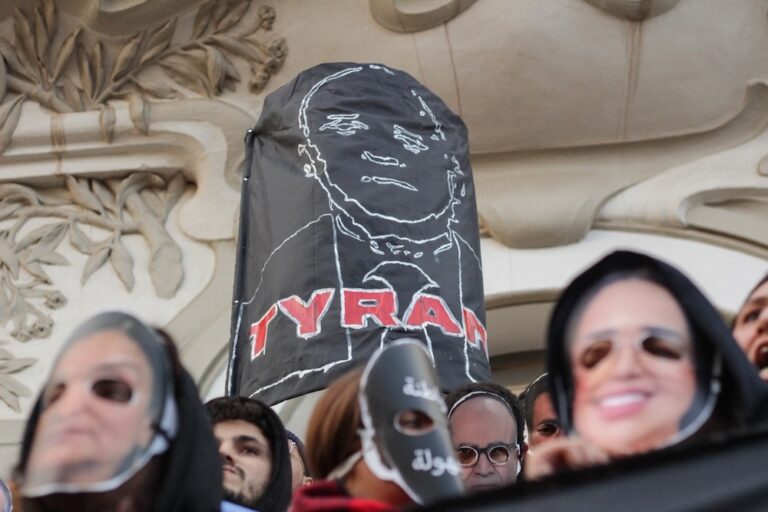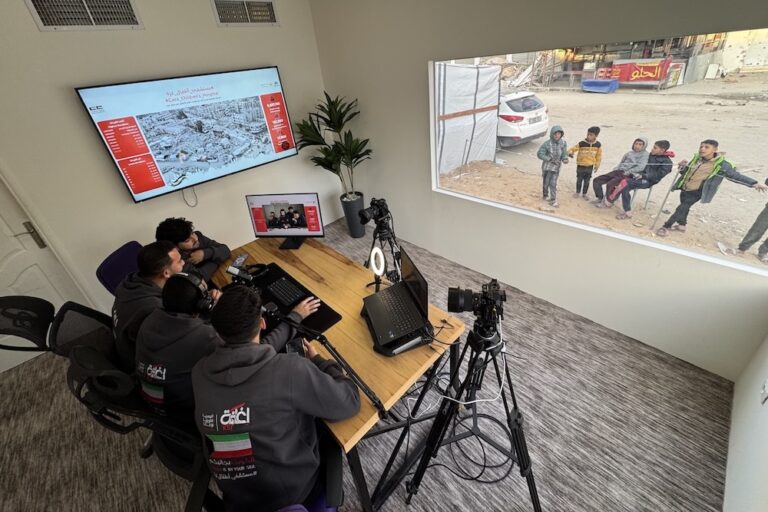April 2025 in MENA: A free expression and civic space round-up produced by IFEX’s Regional Editor Naseem Tarawnah, based on IFEX member reports and news from the region.
As Palestinian journalists face deadly assaults and exiled Sudanese media confront threats, the fight for press freedom grows more urgent. IFEX members join regional civil society groups in demanding stronger protections and a united front against the ceaseless tide of digital and physical silencing.
Killing the story
Palestinian journalists have endured extreme risks during over 18 months of targeting by Israeli forces in Gaza, and April saw further assaults on their lives. In April, IFEX member MADA condemned an Israeli drone strike on a journalists’ tent in Khan Yunis that killed Helmy al-Faqawi and injured nine colleagues.
Rights groups continue to push for accountability and stronger safeguards amid the rising death toll of media workers and civilians, with Reporters Without Borders recently demanding an end to the massacre of Palestinian journalists and Israel’s amassing impunity.
Inside Israel, Palestinian journalists also face severe restrictions, including arbitrary arrests and equipment seizures. Notably, the February arrest of sports journalist Saeed Hasanein, charged with “contact with a foreign agent,” exemplifies Israel’s growing repression of Arab reporters. In their 14 April statement, IFEX member the Arab Center for Media Freedom, Development and Research (I’lam) called Saeed’s arrest a “dangerous escalation in the targeting of journalists in general, and Arab journalists in particular, and a restriction on press freedom in the country.”
Concerned that Israel’s punitive NGO taxation, criminal penalties for ICC cooperation, and restrictive registration rules are dismantling civil society, over 30 Palestinian NGOs issued an open letter on 3 April. They called on international partners to condition diplomatic ties on the protection of Palestinian civil society.
Digital spaces are likewise contested. Leaked Meta data revealed 94 percent compliance with Israeli takedown requests, prompting 7amleh to demand transparency on government orders, restoration of censored posts, and an end to algorithmic bias silencing pro-Palestinian voices.
Amid these threats, MADA’s “Safe Space” workshop in Ramallah on 23 April provided training to 50 media professionals on psychological first aid and stress management. The workshop emphasized mental resilience as a crucial component in safeguarding independent journalism.
Syria: Calling for transitional justice
In a notable step towards accountability, French authorities began trial proceedings for Majdi Nema, a former spokesman for the Islamist rebel group Jaish al-Islam, marking the first war crime case related to Syria’s civil war to be tried under France’s universal jurisdiction law. Nema faces charges related to the enforced disappearance of activists and human rights defenders. IFEX member the Syrian Center for Media and Freedom of Expression (SCM) offered insights on the trial in a Q&A.
Following the brief kidnapping of Suwayda’s transport director, residents in Syria’s Suwayda province rallied in Al-Karama Square demanding a UN-backed transitional justice law and accountability for abductions, killings, and sectarian violence. They rejected impunity and recalled the regime’s February shutdown of a transitional justice conference. The protest underscored growing local pressure to address wartime crimes and restore the rule of law.
SCM was named the 2025 recipient of the Civil Rights Defender of the Year Award , a recognition of its unwavering advocacy, from enduring raids and torture in Damascus to pioneering strategic litigation that led to France’s historic arrest warrant for Bashar al-Assad in 2023.
Smear campaign targets independent media in Lebanon
Last month saw more than 60 civil society and media groups demand an end to legal harassment of online media outlets Daraj and Megaphone, accused of undermining economic confidence and receiving foreign funds. Both outlets have reported extensively on corruption linked to the 2019 financial collapse. The signatories urged authorities to stop SLAPP-style lawsuits, reform media laws, and hold financial wrongdoers accountable.
The Freedom of Opinion and Expression Coalition also condemned coordinated smear campaigns by outlets like the Lebanese broadcaster MTV, accusing them of spreading disinformation to discredit independent media and deflect attention from demands for accountability and reform.
Human Rights Watch warned that the cybercrime bureau and public prosecutors had summoned Daraj, Megaphone and Kulluna Irada under vague defamation and security laws. It called on Lebanon’s new government to affirm free expression, repeal criminal defamation laws, and align legislation with international standards.
A new report from IFEX member Social Media Exchange (SMEX) reveals how digital repression in Lebanon stifles feminist activism, with biased algorithms, legal threats, and patriarchal surveillance contributing to the silencing of women’s voices online. The report calls for stronger protections, greater platform accountability, and unified efforts to reclaim digital spaces.
Amid the growing threats to the country’s press, another IFEX member – Maharat Foundation – won Silver at Dubai Lynx 2025 for “Their Final Shot,” a campaign honouring journalists killed during the Israeli war on Lebanon by preserving their final images as powerful reminders of the cost of truth. as well as its power to endure.
Sudan’s downward spiral and calls for EU support
In April, an RSF drone strike on a Sudanese Television Network vehicle in Khartoum killed three journalists – Farouk al-Zahir, Magdy Abdel Rahman, Ibrahim Mudawi – and their driver while they were covering the SAF’s palace takeover. The International Press Institute (IPI) condemned the attack and called for an independent probe into this breach of international humanitarian law.
Press freedom has collapsed in the war-torn nation. Over 400 journalists have fled into exile since April 2023, spawning at least ten Sudanese exiled outlets from Cairo to Kampala. Reporters Without Borders lauded their resilience, even as Egyptian authorities, aligned with Sudan’s military, have harassed exiled journalists.
Al-Jarida reporter Emtithal Abdel Fadil was blindfolded, detained for three days and placed under a travel ban in a case of harassment condemned by the Committee to Protect Journalists (CPJ). Veteran broadcaster Ahmed Mohamed Saleh Sayyidna was killed by shelling in North Darfur on 14 April.
Atrocities extend beyond the assaults on media. An Amnesty report has documented horrific and widespread use of sexual violence by the RSF between April 2023 and October 2024, war crimes that demand accountability.
Rights groups warn that blocked aid, the mass displacement of nearly 13 million, and impunity for mass atrocities imperil all Sudanese, urging the EU to tie diplomatic and development aid to robust protections for journalists, unhindered humanitarian access, and credible accountability for perpetrators.
Tunisia: Sham trials and arbitrary detentions
Since President Kais Saied’s 2021 power grab, Tunisia has intensified its repression of dissent through arbitrary arrests and politically motivated trials. In a recent escalation, a court sentenced 40 opposition figures, including journalists, human rights defenders, and political leaders, to prison terms of up to 66 years on vague conspiracy charges. GCHR and other rights groups condemned the mass trial as grossly unfair and part of a broader effort to silence critics through the courts. Lawyer and former judge Ahmed Souab was arrested on 21 April after denouncing the “conspiracy case” trial as a “farce”, marking another dangerous escalation against legal defenders.
Recent weeks saw appeals judges reclassify commentator Sonia Dahmani’s prison-condition remarks as a felony under cybercrime law, risking a ten-year term. CPJ has denounced this as an escalation and is demanding her immediate release.
Tunisia informed the African Union Commission of its withdrawal from Article 34(6) of the African Charter, preventing access to individuals and NGOs bringing human rights complaints to the African Court. Rights groups have warned that this move deepens the country’s democratic backsliding and are calling on President Saied to reinstate the declaration and protect fundamental rights.
In Brief
Algeria: Hirak poet Mohamed Tadjadit was sentenced to five years for social media activism, reflecting the country’s growing reliance on broad security and defamation laws to stifle dissent. Meanwhile, UN experts condemned the arbitrary 22-month detention of journalist Ihsane El Kadi and called for the return of his assets and passport.
Bahrain: Prominent human rights defender Abdulhadi Al-Khawaja marked his 64th birthday after over 5,000 days arbitrarily detained for peaceful human rights advocacy, prompting GCHR and allies to renew calls for his immediate release. Three UN Special Rapporteurs also condemned retaliatory summonses, job suspension, and housing-allowance denials against released rights defender and blogger Naji Fateel, urging Bahrain to cease reprisals and ensure his full reintegration.
Libya: The Tripoli Internal Security Agency closed ten international NGOs aiding migrants and refugees, accusing them without evidence of “hostile acts” and demographic manipulation, in a xenophobic campaign that undermines civil society and jeopardizes humanitarian assistance.
United Arab Emirates: An insightful ADHRB report examines the increasing use of AI surveillance systems, like Dubai’s Oyoon network, and raises concerns over privacy and free expression. Meanwhile, the enforced disappearance of activist Abdulrahman Al-Qaradawi, alongside the designation of 11 dissidents and their families as “terrorists,” reflects a broader effort to suppress dissent through overbroad laws.



